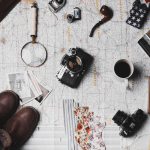I’ve been contacted by a variety of clients who had decided, prior to contacting us, that they’d like to try doing surveillance on their own. Some clients, especially in divorce and custody cases, have a great support system to rely upon. It is often these clients who try to do surveillance on their own or use their support system to keep tabs on their alleged cheating spouse or bad parent.
Although this can certainly save the client some money, it could also get one into trouble. I’ll put out some tips and cautions in the paragraphs to follow.
First, if you’re in a state which requires licensure for private investigators, having a friend or family member perform surveillance might get you into legal trouble.
Second, if there is a restraining order, order of protection, or ex parte on any of the parties involved, you need to steer clear of surveillance. Even your PI needs to limit their activities to act within the scope of the restraining order, order of protection, or ex parte. If one were to conduct surveillance on an individual who either had a restraining order on them, or whom a restraining order had been filed against, they may be found guilty of stalking or harassment. If they had someone else doing their surveillance for them, their surveillance person could be found guilty of stalking, and the person who assigned them to the surveillance of stalking by proxy.
Although the following link talks of more aggressive types of stalking by proxy, it gives a great definition of the idea: http://blog.stalkingbyproxy.com/intro.html
So, my point: If there are any restraining orders, don’t do surveillance and don’t ask someone else to do it for you. Check with your attorney and with your investigator to see what other alternatives exist.
If you’re clear on that legal issue, then some of the following tips may help in your surveillance:
Mobile Surveillance:
Its helpful if you have alternate vehicles at your disposal. Your subject is most likely familiar with your own vehicle, and likely those of your mutual friends. If you have any other vehicles, which you are legally allowed to drive, I recommend using them.
Although using disguises can seem a little silly, it can be helpful if you end up sitting behind your subject at a stop light. Baseball hats and sunglasses are great. Easy to remove and replace. If doing mobile surveillance, making sure items are off the dashboard and not hanging from the rear view mirror is a good idea. Another idea would be to change the items on the dashboard from time to time. Using a vehicle that seems common and doesn’t stand out in a crowd is key as well.
If you do end up sitting behind your subject at a stop light, don’t stare at them. You know they’re in the car in front of you. You don’t need to stare them down. Pretend to talk on your cell phone, change your radio station, and seem naturally uninterested in them.
Don’t use your turn signal. Your subject may change lanes quickly, change their mind, or be checking to see if they’re being followed. If you change your signal or change lanes quickly behind them, this can tip them off.
Allow yourself some room between you and your subject. Although you don’t want to lose them, you’d much rather do so than be discovered. You want to avoid confrontation and discovery. So, you may lose them this day, but being discovered may make it impossible to find them again or follow them another day.
Foot Surveillance:
Foot surveillance can be difficult. You’ve all seen the movies where the detective is moving along at a set pace, keeping up with the subject, when the subject suddenly stops and turns or stops to look into a store window. That stuff actually happens. If your subject is especially paranoid, they may stop and look into a store window to see in the reflection if anyone is watching them from behind.
Don’t get careless when following on foot, zoning out and losing focus on your subject or his pace. You need to be able to stop suddenly if your subject stops. Be prepared for them to turn around suddenly. Be aware of your surroundings so that if your subject does turn around, you can duck into a store or doorway if necessary.
If your subject does turn around and walk the other direction, towards you, don’t stop suddenly and turn around as well. Walk past and go into a store or doorway, trying to find a spot where you can determine if the subject simply forgot something at his previous location (at a store they just left or in their parked car) and will be coming back, or if they changed their mind on their destination. Have patience and trust your instincts. You know your subject better than an investigator.
Fixed Surveillance:
Fixed surveillance can be in a variety of locations. Once you’ve followed your subject in his vehicle and he parks and enters his destination, you may be in for a wait. If its obvious you won’t need to follow the subject on foot, you may need to stay on watch from your vehicle.
You’ll need to be prepared for several possible situations. First, people are nosy. Many folks are completely aware of who does and does not belong in their neighborhood. You might stick out like a sore thumb. Be prepared with a pre-text or BS story for anyone who may confront you as to your purpose in their neighborhood.
Don’t get distracted by your surroundings. If kids are playing near you, totally ignore them and don’t watch them. Watching them will simply creep out their parents and get the police called to your location in a jiffy. Other distractions such as animal life, neighbor activities, noise, etc, can all be distractions which pull your attention away from your subject location. Try not to get focused on alternate activities, even texting on your cell phone, as you could miss something important.
Wave at passersby. Nothing disarms people more than being friendly. If you look like you feel out of place, you’re more likely to have the police called on you. If you’re friendly and act like you belong there, others are more likely to believe that you belong there, too.
You may be there long enough to need sustenance. Bring healthy snacks with protein to keep you alert. Try not to take in too much sugar as you’ll have the sugar high and then the sugar low. You don’t want to fall asleep on the job. Water, energy or coffee drinks are great. All will help you to complete your task.
The drawback of partaking of sustenance is the need to …well… get rid of it. Our primary surveillance van has a camping toilet: http://tinyurl.com/def8xc . Some detectives use depends (no, I’m not kidding). However, I wouldn’t recommend depends for anything beyond urination. You’d be amazed how much one depends will hold!
Male detectives often use a large mouthed bottle. Female detectives have been known to use tupperware bowls with lids. Personally, I recommend the camping toilet and depends. You think you’ll be able to hold it…but, you won’t :).
In some fixed surveillances, you may be in a public location such as a restaurant or bar. Bars are easier due to low lighting. You are less likely to be detected.
In restaurants, you’ll need to make sure you enter long enough after your subject that you won’t be in a line with them, waiting to be seated.
Often, the greeter will try to seat you with their own discretion. Don’t be shy. If you see a table near your subject which would be a prime location from which to listen or observe without detection, make it known to the seater that you need to sit there. They shouldn’t argue with you since it is their job to be gracious to the customers.
Regardless of how you keep an eye on your spouse, be safe and stay objective. Allowing your emotions to overwhelm you can get you into trouble. Ask any police officer and they’ll tell you that domestic situations can be some of the most dangerous for them due to the heightened emotions involved.
Always check with your attorney so they can advise you on the legality of any advice you receive or activities you wish to undertake.
Remember, I’m a PI, your friends are friends. Only your attorney can make sure you’re plans are within the scope of the law and will actually help you in your goals.



